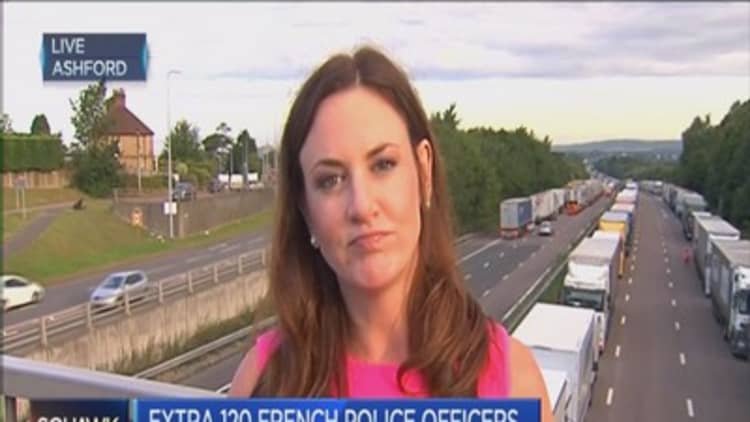
The problem of how Europe handles the increasing number of people risking life and limb for a new life abroad reached a flashpoint this week when thousands of migrants stormed the Channel Tunnel in an attempt to illegally cross into the U.K.
It's the latest incident to spark state-level response on a growing migrant crisis in the European Union -- and on Britain's doorstep.
The incident has prompted not only a crisis response meeting by the U.K. government, but an extra £7 million ($10.9 million) to ramp up security at the French entry point for the tunnel – a vital trade and tourism link between the UK and the rest of the 28-country European Union.
Eurotunnel, the operator of the rail line linking the U.K. and France, told CNBC there were nearly 2,000 attempts to enter the tunnel Monday at the French end, Calais. However, it wasn't clear whether those were by 2,000 different people, or multiple attempts by a smaller amount of migrants.
By Wednesday, an extra 120 French police were dispatched near the tunnel entrance, according to media reports, as hundreds of migrants gathered for a third night alongside terminal fences.
It follows staggering numbers outlined by the Home Office earlier this month, which said there were over 8,000 illegal border crossing attempts intercepted between June 21 and July 11.
Approximately 3,500 have tried to enter the terminal tunnel this week, according to figures cited by the BBC.
In this time, the Channel Tunnel has suffered numerous closures, causing trucks to stack up on freeways on both side of the Channel and holidaymakers to miss the start of their vacations.
The rail operator called the incident 'exceptional.'
"It's something we cannot really deal with, that's why we've called on the [French] state to find a solution," Eurotunnel said.
How did we get here?
Just on the outskirts of Calais, and near the entrance to the tunnel, is the tent-strewn migrant camp from which the refugees make their attempts to enter the tunnel. Some reports suggest the site held upwards of 5,000 people at its peak, but Human Rights Watch told CNBC that the number was hovering around 2,000 at the end of July. As well as trying to enter the U.K. by walking through the high-speed rail tunnel, the migrants attempt to break into container trucks in the hope of crossing the Channel as a stowaway.
Many have ended up in Calais in hopes of entering the U.K., where many may be hoping to reunite with family or friends, gain access to an undocumented labor market, or integrate with an English-speaking people, Aengus Collins, lead euro zone analyst for the Economist Intelligence Unit explained in a phone interview.
Migrants in Calais have made arduous journeys from across the Middle East and North Africa, having left war-torn Syria, or human rights abuses in Eritrea, Afghanistan and Sudan, Izza Leghtas, a researcher at Human Rights Watch told CNBC.
At least one Sudanese man lost his life following Monday's migrant rush, according to media reports, after being hit by a truck unloading from a Channel ferry. Eight other migrants have reportedly died near the terminal site since June alone.
"I think we are probably close to the peak in Calais," Collins said, but emphasized we have yet to see the worst in Europe. Illegal border crossings across the continent are expected to broadly match, if not exceed, last year's record highs, which reached 280,000 according to Frontex, the EU's border agency.
"On macro level," Collins said, Calais "is a drop in the ocean."
Last year, 315,943 migrants were removed from the U.S. alone, according to statistics from U.S. Immigration and Customs Enforcement, which had a budget of $5.8 billion.
Government response
Delays at the Calais crossing have caused disruption to haulage companies, and have essentially knocked exporters and importers, whose distribution chains rely on Channel Tunnel access, Collins explained.
Companies are also having to invest in extra security, to try avoid hefty fines that can be doled out to drivers found to have illegally, and perhaps unknowingly, transported migrants across borders, he said.
And much has been made of delays to holidaymakers on both side of the channel.
Read MoreMigrant tragedy in Mediterranean highlights crisis
Ultimately it's a local disruption, Collins said, and isn't causing much economic disruption on a larger scale.
But comparisons with Europe's larger migrant crisis hasn't tempered the U.K. government's response.
Britain's promised additional £7 million will be used in Coquelles, an area just outside of Calais, bringing the government's total investment in security measures in France to £19 million ($29 million).
Cash pledged last September has already been invested in additional dog searches and upgrading detection technologies. The government is also expected to complete 1.2 miles of fencing at the Coquelles rail platform by the end of the week, according to the Home Office. That's on top of additional barriers being built by Eurotunnel into September.
A joint statement following Tuesday's meeting between Home Secretary Theresa May and the French Interior says France is currently committing 10 million euros ($11 million) annually to cover humanitarian support for Calais migrants, but expects additional costs.
But French efforts aren't enough, according to Human Rights Watch. The organization is currently calling on the French state to provide better accommodation, sanitation and faster asylum claims for the camp's migrants.
Read More EU leaders agree to confront migrant crisis
Leghtas also denounced physical abuse and intimidation by French police
"France has to face their responsibility in Calais," Leghtas said.
Both countries are now coordinating efforts to return migrants to their home countries, particularly in West Africa.
"We'll do everything we can to work with the French to bring these things to a conclusion," British Prime Minister David Cameron told reporters, while speaking in Singapore earlier this week.
"We know how important this is," Cameron added.

